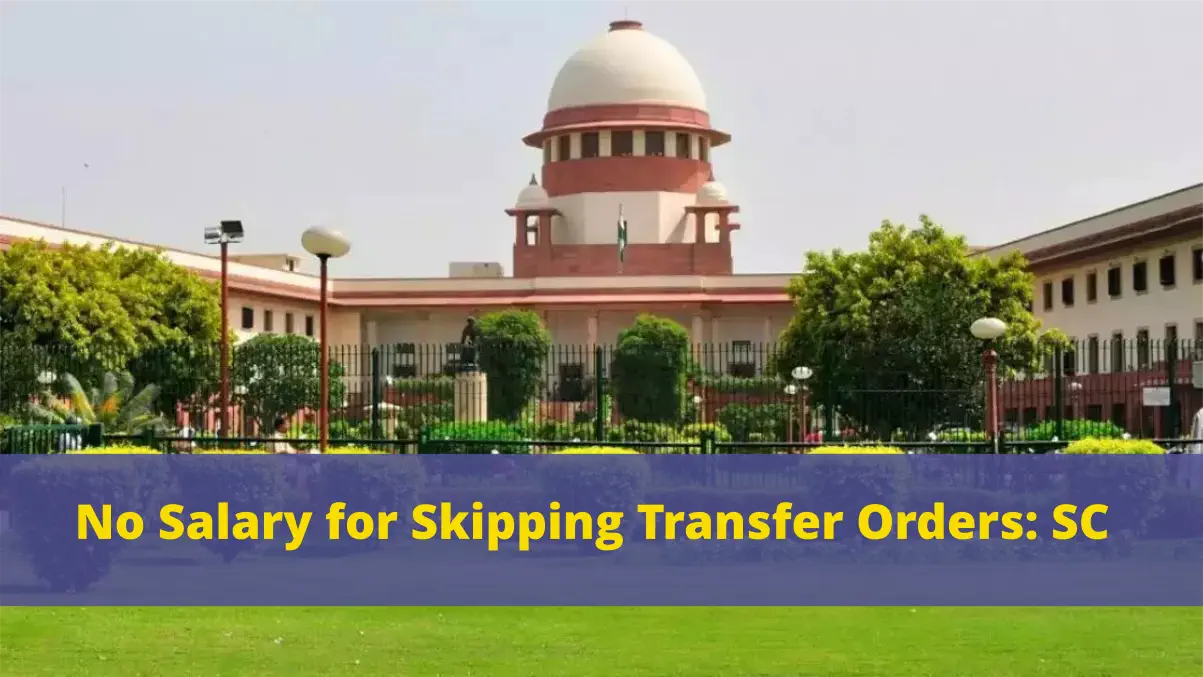Supreme Court Ruling: No Salary for Ignoring Transfer Orders

In a recent ruling, the Supreme Court of India addressed the growing issue of employees resisting transfer orders and remaining absent without authorization. The judgment, delivered by a Bench comprising Justice Vikram Nath and Justice Prasanna B. Varale, emphasizes that transfers are an inherent part of government service, and employees must comply or face the consequences of unauthorized absence.
Background
The appeals were filed by the Tamil Nadu Agricultural University challenging the decision of the Madras High Court, which had quashed the transfer orders for several university employees on the grounds that the transfer orders were not in line with established administrative procedures. During the course of the proceedings, six private respondents—employees of the university—had initially refused to comply with their transfer orders, resulting in unauthorized absence. They subsequently joined their new postings as per an interim direction of the Supreme Court.
The crux of the dispute revolved around whether these employees should be paid for the period of unauthorized absence. The Court addressed multiple facets of the issue, including the responsibility of government employees to honor transfers and the implications of their refusal on public resources.
Key Observations by the Supreme Court on Employee Transfers
The Court made several important observations regarding the rights and duties of employees under service law:
- Transfer as an Exigency of Service: The Court reiterated that transfer is an exigency of service, and government employees are required to comply unless specifically exempted by governing provisions. Employees are permitted to challenge transfer orders legally, but they must do so while complying with the order. In essence, they should join the new post and then pursue available remedies for any grievance.
- Impact of Unauthorized Absence: The Court condemned the act of refusing to join the transferred post while also challenging the transfer order. The judges pointed out that such actions create a financial burden on the public exchequer, as the government might have to pay salaries both to the transferred employees who do not join and to their replacements. This dual expenditure is detrimental to public interest.
- Precedent on Transfer Issues: The Court referred to previous rulings, including Tushar D. Bhatt v. State of Gujarat, emphasizing that transfers are made to meet administrative needs and must be adhered to by employees. The Court also cited Gujarat Electricity Board v. Atmaram Sungomal Poshani, underscoring that non-compliance with transfer orders, even if contested, can lead to disciplinary action.
Details of the Case
The Tamil Nadu Agricultural University had initially appealed against a decision by the Madras High Court that allowed the employees to remain at their original postings due to procedural lapses identified in the transfer process. These six employees—identified as Respondent Nos. 1 to 5 and 7—challenged their transfers but eventually complied after an order by the Supreme Court in February 2023.
The Court noted that four out of the six employees had been granted interim relief by the Single Judge of the High Court, which entitled them to salary during their absence. However, Respondent Nos. 4 and 7 were not granted any such relief and were, therefore, not entitled to receive salaries for the period of unauthorized absence. The Court highlighted that these respondents had wrongfully assumed that they could benefit from the interim orders issued in favor of others.
Supreme Court’s Final Directions
- Directive for Tamil Nadu Agricultural University: Appeals by the university were allowed, setting aside earlier High Court decisions.
- Payment of Dues for Respondents 1, 2, 3, and 5: All pending dues must be cleared, ensuring salaries are disbursed for periods covered by interim orders.
- Non-Payment for Unauthorized Absence: Respondent Nos. 4 and 7 not entitled to salary for unauthorized absence, but service continuity remains intact.
The Supreme Court provided clear directives to resolve the ongoing dispute:
- The appeals by the Tamil Nadu Agricultural University were allowed, thereby setting aside the earlier decisions of the High Court.
- The University was directed to clear all pending dues for Respondent Nos. 1, 2, 3, and 5, ensuring their salaries were disbursed for the period covered by interim orders.
- For Respondent Nos. 4 and 7, the Court held that they were not entitled to salary for the period of unauthorized absence, but their service continuity would remain intact, ensuring they were eligible for other benefits.
The ruling reinforces the fundamental principle that government employees must comply with transfer orders as part of their service obligations. As Justice Vikram Nath noted, this is crucial to ensure administrative efficiency and avoid unnecessary strain on public resources. Challenging such orders does not entitle an employee to disregard their duties, especially when it places an undue financial burden on the administration.
 Loading…
Loading…




